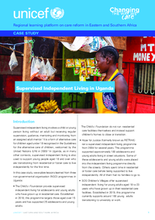Supervised independent living involves a child or young person living without an adult but receiving regular supervision, guidance, mentoring and monitoring from an assigned adult mentor. It is a form of alternative care for children aged under 18 recognised in the Guidelines for the Alternative Care of Children, welcomed by the United Nations (UN) in 2009. In Uganda, as in many other contexts, supervised independent living is also used to support young people aged 18 and over who are transitioning from residential or foster care to live independently for the first time.
This case study explores lessons learned from three non-governmental organisation (NGO) programmes in Uganda:
• The Child’s i Foundation provides supervised independent living for adolescents and young adults who have grown up in residential care. Established in 2018, this programme targets those aged over 15 years and has supported 25 adolescents and young adults. The Child’s i Foundation does not run residential care facilities themselves and instead supports children’s homes to close or transition.
• Hope for Justice (formerly known as RETRAK) ran a supervised independent living programme from 2004 for several years. This programme supported approximately 100 adolescents and young adults living in street situations. Some of these adolescents and young adults were placed into the independent living programme directly from the streets. Others spent time in residential or foster care before being supported to live independently. All of them had no families to go to.
• SOS Children’s Villages offer supervised independent living for young adults aged 18 to 23 years who have grown up in their residential care facilities. Established in 2019, this programme currently supports around 100 young adults transitioning to university or work.
This case study draws on interviews with 15 policymakers, practitioners, adolescents, and young people. The case study also draws on the UN High Commissioner for Refugees (UNHCR) guidelines on supervised independent living.
The evidence collected for this case study demonstrates that well-managed supervised independent living can provide an appropriate form of care for some adolescents, and allow young people to flourish and reach their full potential. However, systems of child protection and care must support these programmes for them to be effective.
See also: Video: Supervised Independent Living in Uganda.
This resource was developed as a part of the Eastern and Southern Africa Regional Learning Platform. Click here to see all learning products developed as part of the platform.

